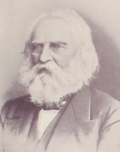The Phantom Ship
by Henry Wadsworth Longfellow
In Mather's Magnalia Christi,
Of the old colonial time,
May be found in prose the legend
That is here set down in rhyme.
A ship sailed from New Haven,
And the keen and frosty airs,
That filled her sails at parting,
Were heavy with good men's prayers.
O Lord! if it be thy pleasure
--
Thus prayed the old divine--To bury our friends in the ocean,
Take them, for they are thine!
But Master Lamberton muttered,
And under his breath said he,This ship is so crank and walty,
I fear our grave she will be!
And the ship that came from England,
When the winter months were gone,
Brought no tidings of this vessel,
Nor of Master Lamberton.
This put the people to praying
That the Lord would let them hear
What in His greater wisdom
He had done with friends so dear.
And at last their prayers were answered:--
It was in the month of June,
An hour before the sunset
Of a windy afternoon,
When, steadily steering landward,
A ship was seen below,
And they knew it was Lamberton, Master,
Who sailed so long ago.
On she came, with a cloud of canvas,
Right against the wind that blew.
Until the eye could distinguish
The faces of the crew.
Then fell her straining topmasts,
Hanging tangled in the shrouds,
And her sails were loosened and lifted,
And blown away like clouds.
And the masts, with all their rigging,
Fell slowly, one by one,
And the hulk dilated and vanished,
As a sea-mist in the sun!
And the people who saw this marvel
Each said unto his friend,
That this was the mould of their vessel,
And thus her tragic end.
And the pastor of the village
Gave thanks to God in prayer,
That, to quiet their troubled spirits,
He had sent this Ship of Air.
Notes to the poem:
A detailed account of this apparition of a Ship in the Air
is given by Cotton Mather in his Magnalia Christi, book i, ch vi. It is contained in a letter from Rev. James Pierpont, Pastor of New Haven. To this account, Mather adds these words: --
Reader, there being yet living so many credible gentlemen, that the eyewitnesses of this wonderful thing, I venture to publish it for a thing as undoubted as 'tis wonderful.
Source:
Longfellow's Poetical WorksCopyright 1893
Henry Frowde, London
